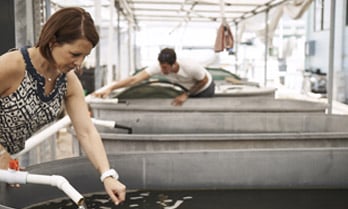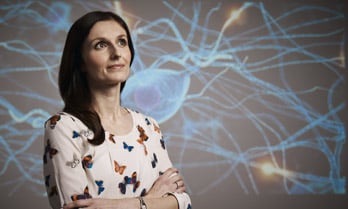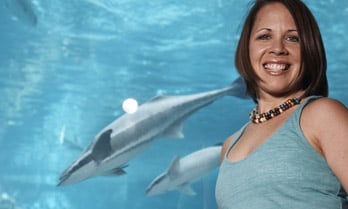Hot future for sharks
08 September 2015
Dr Jodie Rummer swims with sharks for her research. She is fascinated by fish and their ability to deliver oxygen to their muscles 20 to 50 times more efficiently than we can.
Dr Jodie Rummer swims with sharks for her research. She is fascinated by fish and their ability to deliver oxygen to their muscles 20 to 50 times more efficiently than we can. Her global research into salmon, mackerel, hagfish, and now sharks explains why fish dominate the oceans, and has given her the opportunity to swim with sharks in the world’s largest shark sanctuary, in French Polynesia.
Her L’Oréal-UNESCO For Women in Science Fellowship will help her predict how sharks and other fish will cope with rapidly changing oceans. Some will be winners, some will be losers as the climate changes. That’s a problem not just for the oceans, but also for the communities that depend on fish for protein.
“Fish have been on the planet for hundreds of millions of years. It’s up to us to ensure they’re here for the next 100 million years,” she says.
 Jodie is a marine biologist at James Cook University and the Australian Research Council Centre of Excellence for Coral Reef Studies in Townsville.
Jodie is a marine biologist at James Cook University and the Australian Research Council Centre of Excellence for Coral Reef Studies in Townsville.
She grew up far from the sea, in Illinois. But she always loved the water, and watching Jacques Cousteau marine science documentaries and the Discovery Channel. When her parents bought her a mask and snorkel she spent hours exploring the backyard swimming pool. So it was perhaps inevitable that she’d go on to a career in marine science. Jodie first went to the University of West Florida, where for her Masters she studied the swim bladder of snapper. It’s an amazing organ that allows many fish to move up and down in the water column without sinking. They rapidly pull oxygen out of their blood to fill the bladder.
Understanding this ‘trick’ led Jodie into a stellar early career research path taking her from Florida to the University of British Columbia, then City University Hong Kong, and now James Cook University in Townsville where she is an Assistant Professor and holds an Australian Research Council Discovery Early Career Research Award (ARC DECRA). Jodie’s research focus is on understanding how oxygen transport works in fish and how it is affected by stress and their ability to adapt to their habitats. What’s different about their haemoglobin and other aspects of their biochemistry that makes them so efficient at transporting oxygen around their bodies? Jodie believes that this is what had made fish the dominant life in our planet’s oceans.
She has studied mackerel that can swim at high speed for long distances. She’s looked at how salmon swim thousands of kilometres to the river of their birth. And she’s studied hagfish that can live inside dead whale carcases sitting on the ocean floor – a very low oxygen environment.
Fish have been evolutionary winners. But how will they adapt with the rapid changes taking place in the oceans now? “Fish have been on the planet for hundreds of millions of years. It’s up to us to ensure they’re here for the next 100 million years,” Jodie says.
Jodie and her colleagues have already shown that fish living around the Equator are most at risk because they evolved in a local environment with a narrow range of temperatures. Just two or three degrees increase could affect the long term sustainability of fish that many communities depend on for food.
To get a better understanding of the capacity of fish to adapt, Jodie is working with sharks on the Great Barrier Reef, in Papua New Guinea, and in French Polynesia. In Townsville, she works with epaulette sharks. They live on coral reefs and tidal pools and can cope with severe oxygen depletion, elevated carbon dioxide, and high temperatures. Her L’Oréal-UNESCO For Women in Science Fellowship will enable her to expand her work in the world’s largest shark sanctuary in Moorea, French Polynesia. There she will study sicklefin lemon sharks and black-tip reef sharks which may be less able to adapt to future ocean conditions, as they only come in to coastal lagoons to pup.
“My L’Oréal Fellowship will help me determine the mechanisms these sharks will require to adapt to warming oceans. In the long term, understanding how sharks will respond to future ocean conditions will help us make wise decisions needed to protect and conserve the world’s fish populations in general,” says Jodie.
Jodie’s work has attracted global scientific and media attention. She is also a strong advocate for improving the status of women in science and authored three chapters in a new book, Success Strategies from Women in STEM, A Portable Mentor.



